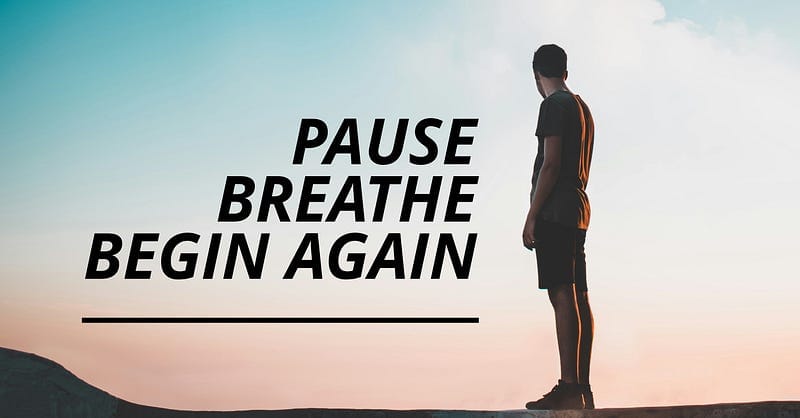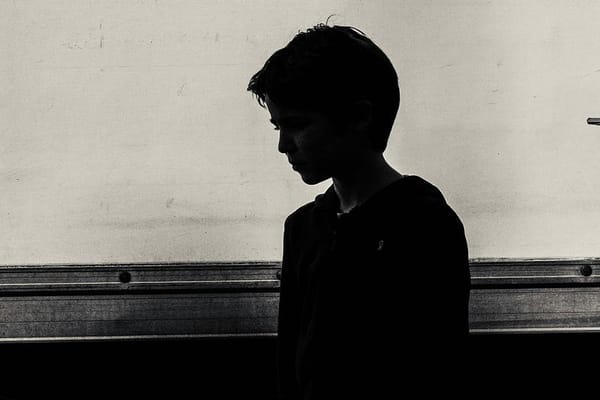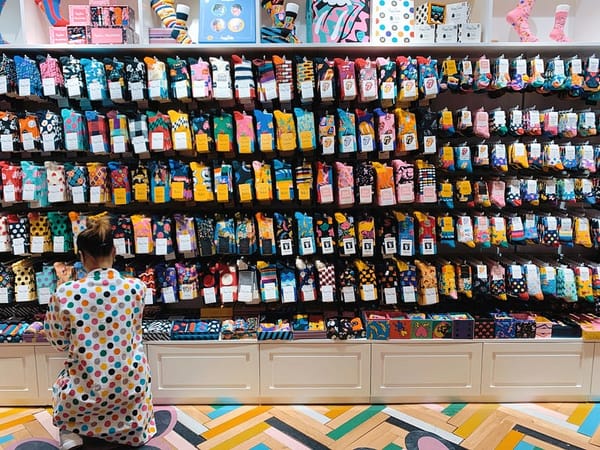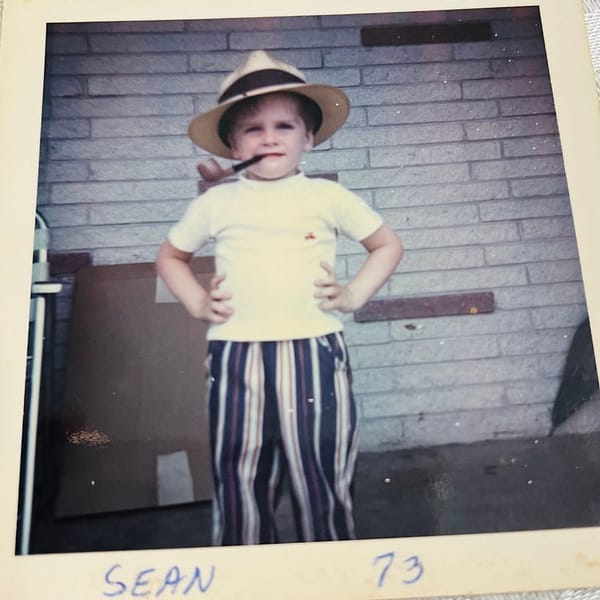Every morning my alarm goes off at 5:45am. Once I tell it to stop, that familiar voice starts my day by giving me the forecast followed by some words of wisdom like, “When life gives you lemons be thankful. Most people have to buy them at the grocery store.” And then, seemingly with thoughtfulness, she says, “Remember to look in the mirror today and say: You got this, you can do it; I believe in you. Even if you're scared, you're brave. So when things get tough pause, breathe, and begin again.” Of course she doesn’t just decide to tell me that every morning on her own; I wrote the script for her. But it’s something I wrote because I need the push. And I need it every day.
For what seems like my entire adult life I’ve lived with Bipolar I Disorder and ADHD. Yeah, both at once. And for the last 29 years I’ve been on meds, off meds, in-patient, out-patient, overly happy, overly depressed, agitated, irritated, hyperfocused, scattered and of course, also pretty good. I would never tell anyone that every single day of my life is in shambles.
Except lately it kind of has been.
Last week I had what seemed like a complete meltdown prompted by the inability to focus on my latest music project. I was being bombarded by all of my inner voices. All of them except the one that says, “You can do it!” Nothing I was composing was right at all; it sounded like garbage. I was getting close to my self-imposed deadline and I wasn’t even close to finishing, but who cares!! It didn’t matter anyway. I rarely finish things when I say I’m going to. When I do finally share my music with family I barely get any response. My friends talk to everyone about everything they read, watch, and listen to until it comes to anything I’ve created. So, why bother? That’s what it feels like anyway.
Ding! I looked down at my phone. There was a new email, a newsletter from a website my therapist told me about. The featured article was about something called Rejection Sensitive Dysphoria (RSD). Very simply, Rejection Sensitive Dysphoria is a condition that causes people to experience intense and sometimes debilitating emotional pain in response to rejection or criticism, real or perceived. It is considered a type of emotional dysregulation seen in people living with ADHD, especially adults.
As I finished the article, I realized I had been crying from almost the first paragraph. This was my life! Not just now, but for as far back as I can remember. This struggle had a name; it was a thing. I couldn’t hold back the tears, and a voice — my voice — softly whispered, “It’s okay … remember you are brave. Just pause, breathe, and begin again.”
Since high school, I’ve hopped from one interest to another. But two constants have been music and writing. I’ve been a musician literally all my life, but I’ve also loved writing since my early teens. I wrote a musical — book, music and lyrics — when I was 15 and I wrote a young adult novel when I was 16. Neither of those made it much further than my backpack, because I could never expose myself to the amount of negative criticism I just knew I would receive. But their creation was my first real glimpse into what I wanted to do with my life. And how later it became so scattered and scary.
My first high school was full of bullying — actually it was like that from second grade on, but I’ll tell you all about that later — and college ended pretty quickly with what I now believe might have been my first noticeable bipolar depressive episode. When I got back home from my short stint at college life, I felt like a complete failure. It didn’t take too long before things went upside down, sideways, backwards and inside out.
I did find a job in music. Okay, I was selling opera tickets and I got to tour backstage during my lunch breaks, but it was still music adjacent. I knew I wasn’t good enough to perform there even though I had never auditioned for anything. In-between calling the rich season ticket holders to try coercing them into upgrading or extending their subscriptions, I found an ad in the paper — yeah, an ad in the paper; it was 1991, after all — I landed a job as “the light guy” at the biggest nightclub in the city. I was shy, felt nervous pretty much all the time and while I looked just fine on the outside, I was super self conscious on the inside, all the time. Could I actually be good enough or cool enough for this? I went ahead and shoved all that to the back of my mind because it meant that I was closer to what ended up being one of my maybe not-so-secret dreams … to be a dj.
I actually loved working in the club. What I was doing was helping people have fun, making people happy. I also started loving what I was getting to make my own nights happy. Nightlife became high life and even though I had a bunch of friends, a lot of them were really only my friends for one reason. It wasn’t me, my spectacular light shows, or my music. One day, after a heated conversation with a guy I had fallen for and moved in with, where he told me he wasn’t really interested — that I was just convenient, half the rent — I fell apart.
I remember “waking up” in the late afternoon from what I learned later was a sort of blackout moment. I was on the floor of our kitchen soaked in sweat, sobbing with a pair of scissors next to me. My wrist red, but not cut. The phone was ringing. It was my best friend calling to ask what I was up to. When I told him where I was and what was happening, he told me to stay right there. The gang was coming over right now. That night would be my first spent in a psychiatric hospital as a suicide risk even though I never intended that nor did I know I was doing it. I learned about being Bipolar in that hospital and I felt like a failure, again.
Two decades later after another hospital, a cross country move, another club, a gay newspaper, a radio station, a monastery, a bookstore, a pizza joint, two more cities, and an entertainment supply company — I know you’re back there at the monastery part; I’ll tell you all about that later, too — I met a guy. In a department store. Next to a rack of men’s jeans. It was what some people call a serendipitous meeting, one of those kinds of happy accidents that leads to something wonderful. And that is definitely what happened; he became my rock, my partner, and my soulmate. We did everything together and told each other everything, even things we never told anyone else. He held me when I felt like crying, dried my tears before I even knew they were there. And I did the same for him.
He was so proud of all the music I had composed and recorded. Sometimes when I got in his car, one of my songs would come on as he started the engine and he’d turn to me and smile. He also loved the stories I'd shared from a hard drive I rescued from an old, dead computer. He encouraged me to do more writing, and we talked a lot about me recording more music. He would often tell me, “I know it's been a while but I know you, I believe in you; you can do it.”
I never did any of it, though. I just couldn’t do much more than make plans.
In the summer of 2023, after eight of the best years I had lived in my 53 years on this planet, I lost my partner to a rare form of brain cancer called a brainstem glioma. It was an agonizing six month battle, first at home, then in the hospital. And we both fought hard every day. Every time a doctor would come in and give us some sort of bad news, we held hands and said to each other, “We got this.” It became our mantra.
I lived every day at the hospital with him and helped the nurses with everything I was allowed. When he couldn’t move on his own anymore, I helped with his physical therapy. And when he couldn’t talk anymore, I talked for him. We announced to everyone that once he made it through rehab and came home, we were going to get married. Three weeks later, I held his hand when he couldn’t breathe anymore. I was devastated, heartbroken, and alone.
I took a month of personal leave from a job I had grown to loathe after eleven years — the longest job I’d ever held. My grief had kickstarted another bipolar depressive episode and my ADHD was out of control so I started weekly therapy, new meds and came up with a brand new plan. Okay, it seemed at the time more like a pipe dream, but I was going to turn it into a plan. After laying out the pros, the cons, and the rough details in talks with my best friend — the one who took me to the hospital way back when — I decided that, as an almost 54 year old, it was time I did what I wanted to do all my life, tell stories.
I quit my job. It was time to tell mine.
After nearly a year of getting my life going again, being somewhat semiretired — composing new music, raising a new puppy, and telling my friends and family the stories of, well, everything — I’ve been encouraged more times than I can count to write a book.
“You’ve come a long way. And you have a lot to teach others,” a friend told me.
“You are a brave soul. And yes, write a book!” another said.
“You have got this!!!”, my cousin wrote with heart emojis.
It still feels terrifying. I mean, now I’m an almost 55 year old and I just found out I suffer from a new acronym. And here I am telling everyone about it. But does it all matter? I think it does. One thing I’ve been ashamed of my whole life is my mental health. Growing up in the 80s — even before I knew I had anything — you just didn’t talk about things like that or you’d be the gossip of every highschooler and overprotective mother group in the neighborhood. And there was no internet. No way to find out about others who may have stories to help you feel less alone, less ashamed, less like a freak. Of course there was the library, but no one rode their bikes to the library, we went to the malls — where there were arcades. Dark rooms full of noise and kids, looking to escape their own issues, like homework and bullies.
Even now, with the internet, an entire universe that can fit in your pocket, people still don’t talk about mental health. They talk about how more people need to be talking about mental health. And there are literally hundreds of YouTube videos, podcasts and articles all social media saying things like “10 Ways to Know if You Have (_____) Disorder”. But what there is much less of is hope. Hope comes from regular people, genuine people; their stories, their pain, their resilience, their kindness, and their encouragement. You know, I’m not a doctor. I’m not a therapist. I’m just a regular person I wish I’d known when I was younger, telling me that it was going to be okay.
Telling me, “Remember to look in the mirror today and say: You got this, you can do it; I believe in you. Even if you're scared, you're brave. So when things get tough pause, breathe, and begin again.”
Thank you for joining me on this journey. A journey of self-discovery through traumas, triumphs, heartbreaks, and hilarious happenings. Tales of roller-skating to the Bee Gees, fourth-grade bullies, first crushes, paralyzing depression, late-night dancing in parking garages, and, of course, the monastery. And through it all, I found my own voice, my own strength, and my own hope in the face of … well, everything.





